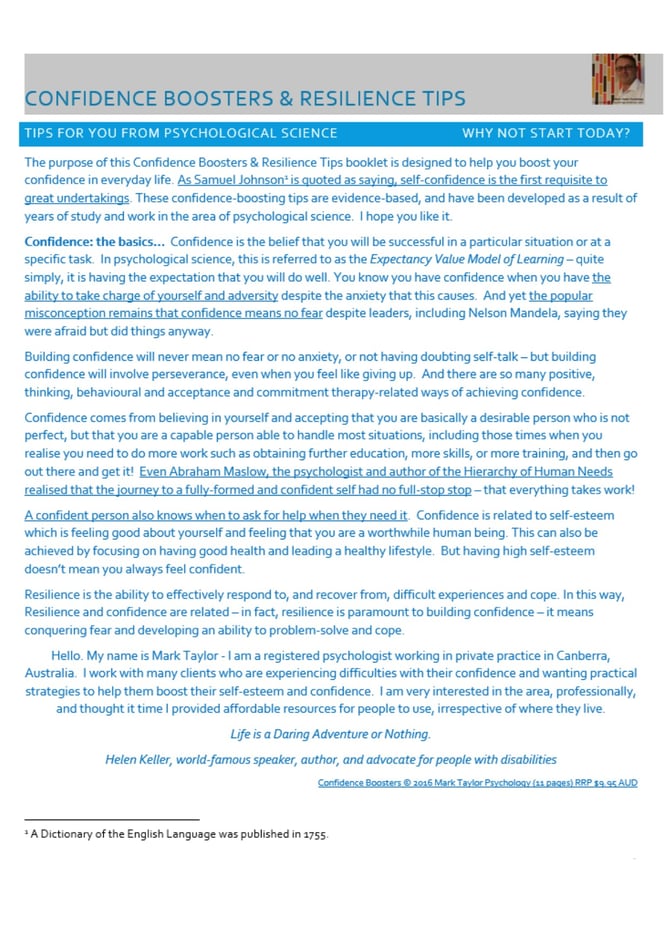
Confidence Boosters & Resilience Tips: Tips for you from psychological science
The purpose of this Confidence Boosters & Resilience Tips booklet is designed to help you boost your confidence in everyday life. As Samuel Johnson[1] is quoted as saying, self-confidence is the first requisite to great undertakings. These confidence-boosting tips are evidence-based, and have been developed as a result of years of study and work in the area of psychological science. I hope you like it.
Confidence: the basics… Confidence is the belief that you will be successful in a particular situation or at a specific task. In psychological science, this is referred to as the Expectancy Value Model of Learning – quite simply, it is having the expectation that you will do well. You know you have confidence when you have the ability to take charge of yourself and adversity despite the anxiety that this causes. And yet the popular misconception remains that confidence means no fear despite leaders, including Nelson Mandela, saying they were afraid but did things anyway.
Building confidence will never mean no fear or no anxiety, or not having doubting self-talk – but building confidence will involve perseverance, even when you feel like giving up. And there are so many positive, thinking, behavioural and acceptance and commitment therapy-related ways of achieving confidence.
Confidence comes from believing in yourself and accepting that you are basically a desirable person who is not perfect, but that you are a capable person able to handle most situations, including those times when you realise you need to do more work such as obtaining further education, more skills, or more training, and then go out there and get it! Even Abraham Maslow, the psychologist and author of the Hierarchy of Human Needs realised that the journey to a fully-formed and confident self had no full-stop stop – that everything takes work!
A confident person also knows when to ask for help when they need it. Confidence is related to self-esteem which is feeling good about yourself and feeling that you are a worthwhile human being. This can also be achieved by focusing on having good health and leading a healthy lifestyle. But having high self-esteem doesn’t mean you always feel confident.
Resilience is the ability to effectively respond to, and recover from, difficult experiences and cope. In this way, Resilience and confidence are related – in fact, resilience is paramount to building confidence – it means conquering fear and developing an ability to problem-solve and cope.
Hello. My name is Mark Taylor - I am a registered psychologist working in private practice in Canberra, Australia. I work with many clients who are experiencing difficulties with their confidence and wanting practical strategies to help them boost their self-esteem and confidence. I am very interested in the area, professionally, and thought it time I provided affordable resources for people to use, irrespective of where they live.
Life is a Daring Adventure or Nothing.
Helen Keller, world-famous speaker, author, and advocate for people with disabilities
[1] A Dictionary of the English Language was published in 1755.
 Cart
Cart  Checkout
Checkout